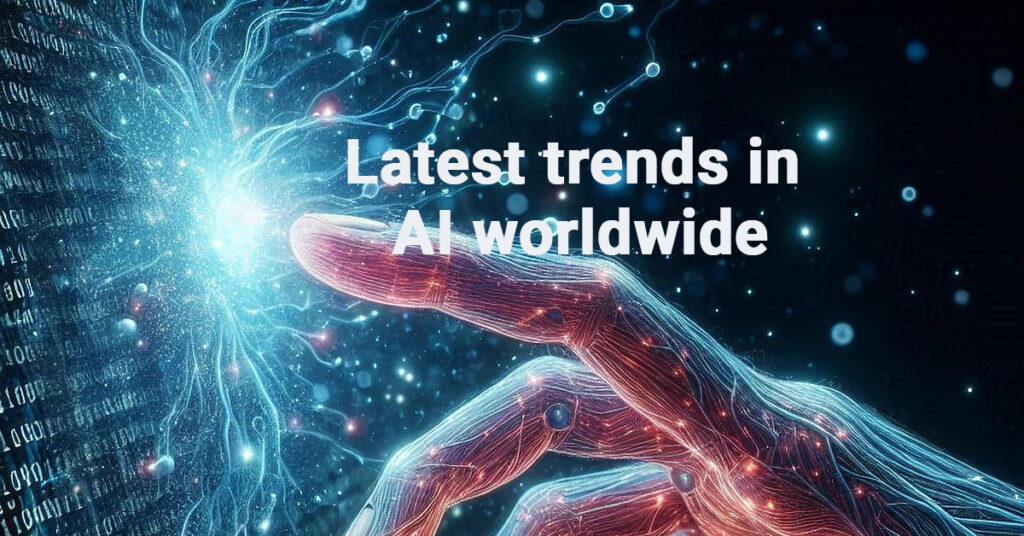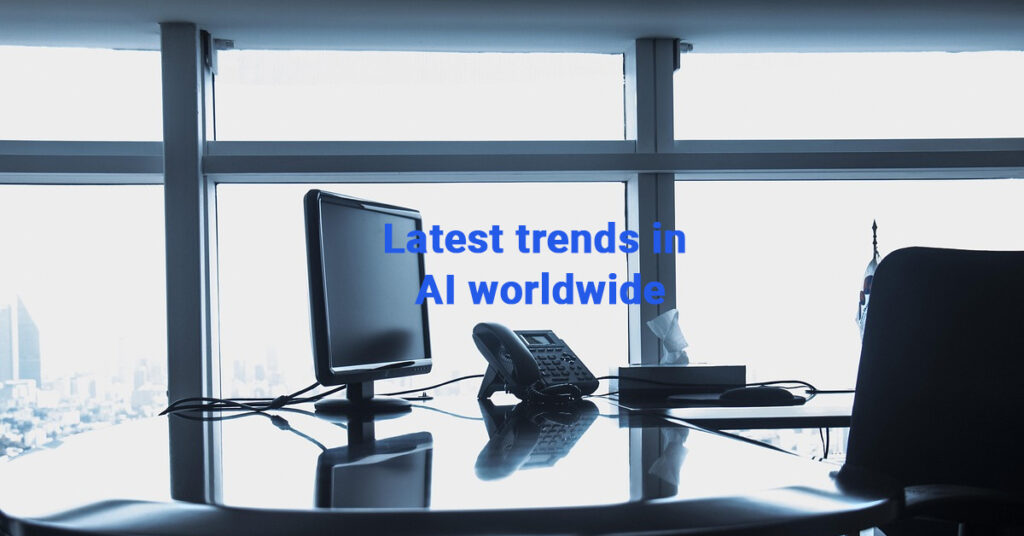The Latest Trends in AI: How Artificial Intelligence Is Transforming the World

* Introduction
Artificial Intelligence (AI) is no longer a futuristic concept — it is the driving force behind the global digital revolution. From intelligent chatbots and self-driving cars to AI-powered healthcare and business analytics, this technology is transforming the way we live and work. The latest trends in AI worldwide show that innovation is moving faster than ever, with new tools and systems shaping the global economy and society.
In this post, we’ll explore the latest AI innovations, discuss how machine learning applications are evolving, and uncover how AI automation, generative AI, and ethical AI principles are changing industries around the globe.
* 1. Artificial Intelligence Innovations Driving Global Change
The world is witnessing groundbreaking AI innovations that go beyond simple automation. Businesses are using AI to create personalized customer experiences, predict market changes, and optimize operations in real time. In 2025, leading innovations include AI-driven creativity, predictive data modeling, voice recognition systems, and AI-based cybersecurity.
For instance, AI models can now compose music, write articles, and even design marketing campaigns within seconds. These innovations not only increase productivity but also help companies stay competitive in the digital era.
* 2. Global AI Development: Nations Competing for Leadership
AI has become a global race among countries. The United States, China, Canada, Japan, and European nations are heavily investing in AI research and development. Governments are creating AI-friendly policies and funding initiatives to attract top researchers and startups.
China leads in AI patents and industrial adoption, while the U.S. dominates in AI research and generative AI platforms. Meanwhile, Europe focuses on ethical AI frameworks that balance innovation with user privacy. This global AI development is building an interconnected future where collaboration, not competition, will define success.
* 3. Generative AI Technology: The Power of Creation
One of the most exciting trends in AI is the rapid growth of generative AI. This technology enables machines to create original content — from images and music to entire articles and business strategies. Tools like ChatGPT, Midjourney, and DALL·E have already revolutionized content creation.
In 2025, generative AI is being integrated into video production, advertising, education, and even healthcare simulations. It’s helping designers brainstorm, marketers create campaigns, and researchers model complex biological data. However, while generative AI increases creativity, it also raises ethical questions about originality and authenticity — topics discussed under AI ethics and safety.
*4. AI Automation Tools Revolutionizing Workflows
Automation is not new, but AI automation tools are making it smarter and more efficient than ever. These tools can analyze data, make decisions, and execute actions without human input. From automating customer service via chatbots to managing logistics and financial systems, AI is optimizing workflows across industries.
Businesses now rely on automation tools like Zapier with AI, Microsoft Copilot, and Google Vertex AI to handle repetitive tasks. The result? Increased productivity, reduced costs, and more time for employees to focus on strategic innovation.
* 5. Machine Learning Applications in Real Life
Machine learning (ML) lies at the heart of AI’s global progress. ML algorithms learn from massive datasets to predict outcomes, identify patterns, and make smart recommendations. In the real world, machine learning applications are everywhere — from Netflix suggesting your next favorite show to banks detecting fraudulent transactions.
Healthcare institutions use ML to detect diseases early, while logistics companies rely on predictive models to optimize delivery routes. The rise of edge computing and federated learning means AI can now process data securely and efficiently, even on local devices.
* 6. AI in Business: The Future of Smart Decision-Making
Businesses around the world are adopting AI in business to stay competitive. From small startups to global enterprises, AI-powered analytics help companies make smarter, data-driven decisions. Predictive AI tools forecast sales trends, analyze customer behavior, and even suggest pricing strategies.
In 2025, AI in business is not just about automation — it’s about transformation. Companies are creating hybrid teams where humans and machines collaborate, blending creativity with computational intelligence. This shift is redefining the workplace and creating new job opportunities in AI management and oversight.
* 7. AI in Healthcare: Saving Lives with Smart Technology
AI in healthcare is one of the most impactful applications of this technology. Doctors and hospitals now use AI to analyze X-rays, diagnose diseases, and recommend personalized treatment plans. Machine learning models can detect early signs of cancer or heart disease with greater accuracy than traditional methods.
AI-powered robots assist in surgeries, while virtual health assistants provide 24/7 patient support. In developing countries, AI-driven telemedicine platforms are bridging the gap between doctors and patients. As the global population ages, AI in healthcare will continue to play a vital role in improving accessibility and outcomes.

* 8. Future of AI: Smarter, Faster, and More Responsible
The future of AI looks both promising and challenging. As AI becomes more powerful, discussions around AI ethics and safety are growing stronger. Future AI systems must be transparent, fair, and aligned with human values.
We can expect the rise of self-learning AI, quantum AI computing, and emotionally intelligent AI that understands human feelings. The focus will shift toward sustainable AI development — balancing technological growth with environmental responsibility and ethical considerations.
* 9. AI Ethics and Safety: Building Trust in Technology
As AI becomes more embedded in our daily lives, AI ethics and safety are essential. Issues such as data privacy, bias, misinformation, and job displacement require serious attention. Organizations are developing frameworks to ensure that AI is used responsibly and for the benefit of society.
Ethical AI focuses on transparency — ensuring people understand how AI decisions are made. It also includes accountability, where humans remain in control of critical systems. A trustworthy AI ecosystem is key to ensuring the technology enhances humanity rather than replaces it.
? FAQs: Common Questions About AI Trends
1. What are the latest trends in AI for 2025?
The biggest trends include generative AI, automation tools, ethical AI frameworks, AI in healthcare, and machine learning-powered analytics.
2. How is generative AI changing industries?
Generative AI allows machines to create original text, visuals, and strategies — transforming content creation, marketing, and research.
3. Which countries lead in global AI development?
The U.S., China, Canada, and the European Union are currently leading AI research and implementation.
4. Why is AI ethics important?
AI ethics ensures fairness, accountability, and transparency — preventing misuse of AI in decision-making or data handling.
5. What is the future of AI jobs?
While AI will automate many routine tasks, it will also create new jobs in data science, AI management, and ethical oversight.
6. How does AI benefit healthcare?
AI helps diagnose diseases faster, predict patient risks, and personalize treatments, improving healthcare accessibility and outcomes.
7. Can AI completely replace humans?
No — AI enhances human capability but cannot replace creativity, empathy, and moral judgment.
* Final Note:
The world is standing on the edge of a new era — powered by Artificial Intelligence. Whether it’s business innovation, healthcare improvement, or global development, AI is redefining human progress. The key is to balance innovation with ethics, ensuring technology works for humanity, not against it.